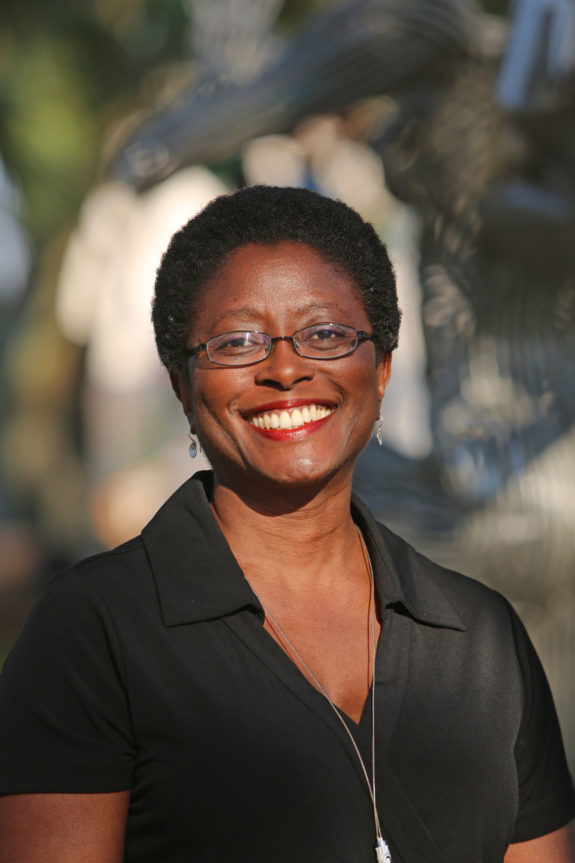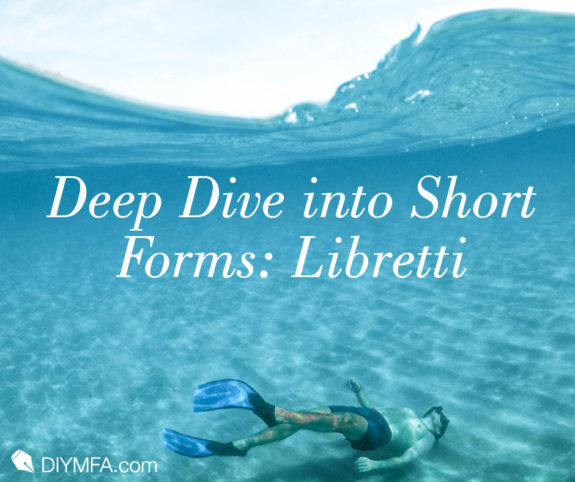Throughout my Deep Dive series, I’ve talked about things I know. I’ve examined essays, novellas/novelettes, flash, poetry, and more. All the short form literature I not only read but also wrote or attempted to write. However, this particular form, libretti, is something I’ve never attempted.
At DIY MFA, my fellow writers and I write in order to instruct and encourage you, our readers, to try new things and add to your repertoire of knowledge and skills. I would be remiss in not applying the same to myself. So, let’s learn about this exciting type of writing together.
Librettists and Dramatists and Lyricists, Oh My!
What are libretti? The term is the plural of libretto. If you are a fan of opera, musical theatre, or ballet, you’ve actually read a portion of a libretto. And you probably didn’t even think about it apart from the show you were attending. It was simply part of the opera/ballet/theatre-going experience. Yet, there’s more to libretti than the small booklet you were handed.
Writers of libretti are called librettists. Librettists write the story, script and lyrics for operas, musicals, and ballets. These specialized playwrights are also referred to as dramatists and book writers. They are additionally called lyricists when their work involves writing lyrics for a show’s songs. However, a lyricist’s job does not generally include penning libretti.
The renowned Berklee College of Music offers this definition of a librettist:
“A particular variety of playwright who specializes in the intersection between text, music, and theater […] [T]he librettist’s first job is often to create a “treatment”: a short document which contains an outline of the characters, story, dramatic structure, and scripted dialogue of the work. If the treatment interests [backers], the librettist might begin to develop a full script—often referred to as the show’s libretto or “book”—without which an opera or musical would simply be a staged concert or song cycle.”
In opera and musical theatre, the composer reigns supreme in terms of publicity and public recognition. In dance theatre, choreographers share the top space with composers. Librettists often recede into the background. Yet, some librettists — past and present — have fully broken into the limelight. Stephen Sondheim, W. H. Auden, E. M. Forster, W. S. Gilbert, and Lin-Manuel Miranda are a small sampling of star librettists.
The Order of Things
Besides operas, musicals, and ballets, libretti – Italian for little books – are written for operettas, oratorios, and cantatas. While it’s difficult to find a specific page length for an average libretto, the form is characterized by its brevity. Most libretti, with variations for show genre included, end at substantially less than 100 pages.
When writing a libretto, a librettist uses the following style tenants:
- Un uncomplicated vocabulary – i.e. 8th grade – and grammar
- Clear and easy to follow story lines
- Relatable characters, but no stereotypes
- Situations that call characters into song
- Room for song/dance to finish plot and character development
- Smooth transitions between text and song/dance
Librettists come from varied writing backgrounds such as plays, poetry, fiction, screenplays and other types of professional writing. Surprisingly, collaborative ability, rather than music knowledge, tops the list of skills needed for a budding librettist.
With this last Deep Dive article, I’m going to break away from my format of offering examples. Why? There’s no succinct way to illustrate how libretti and the various show forms interact. It requires experiential interaction, i.e. reading the libretti along with the show’s video and/or audio accompaniment. I suggest studying the following short list of librettists, libretti (as well as their inspiration) and shows considered excellent examples of the respective genres:
| Librettist | Show | Inspiration | Genre |
| W. S. Gilbert | Pirates of Penzance | Gilbert’s own idea | Operetta |
| Lin-Manuel Miranda | Hamilton | Alexander Hamilton by Ron Chernow | Musical |
| Jules-Henri Vernoyde Saint-Georges | Giselle | Giselle by Adolphe Adam | Ballet |
Many Doors, One You
If writing libretti is new to you, here are links to learn more about being a librettist, training, and fellowship/mentorship opportunities:
- @LibrettistNet (Twitter) – The Librettist Network aims to develop the craft of libretto writing, ensure librettists are valued, find new voices & develop new work.
- Composer Librettist Development Program – This program is the only full-time professional mentorship initiative for operatic writers in the country. It is hosted by American Lyric Theatre and begins its next cycle in Fall 2021.
- How to Become a Librettist, Stephen Plaice – This article in The Guardian is an informative overview of becoming an opera librettist. Plaice was the 2015 writer-in-residence at the Guildhall School of Music and Drama.
- Jerwood Opera Writing Programme – This UK program is made up of two parts: Foundation and Fellowships. The Foundation provides a year-long course of workshops and seminars to help with creating new opera. Fellowships facilitate new opera development by providing financial support, mentoring, and expertise to creators over a two-year period.
- On the Art of Libretto Writing, Terry Quinn – Librettist Terry Quinn addresses being a librettist in three articles –
- Opera Jobs: The Librettist (video) – Librettist Emma Jenkins talks about her work as an opera librettist with the English National Opera.
- Rules for Writing Libretto, Joshua McGuire – Librettist Joshua McGuira lays out his rules for writing libretto and rule #1 is “Don’t.” Thankfully he doesn’t stop there but offers seven other rules to start beginning librettists off right.
- Sotto Voce: The Libretto as Literary Form, Dana Gioa – This essay, in poet Gioa’s “Nosferatu: An Opera Libretto”, gives an enlightening glimpse into what a writer considers when deciding to write a libretto.
Although I focused primarily on older works, the world of libretti is very much alive. Original operas, ballets, and musicals are created regularly through arts organizations, foundations, universities, and independent productions. All of which require the librettist’s expertise. And thankfully, these productions open their doors to a more diverse and inclusive group of writers. Maybe, even you.

Brenda Joyce Patterson is a poet, writer, librarian, and lover of short writing forms. Her poetry and flash fiction have been published in Vayavya, Gravel Magazine, and Melancholy Hyperbole. Along with works by Maya Angelou, Gwendolyn Brooks, and Alice Walker, her travel essay “The Kindness of Strangers” appeared in Go Girl: The Black Woman’s Guide to Travel and Adventure.







